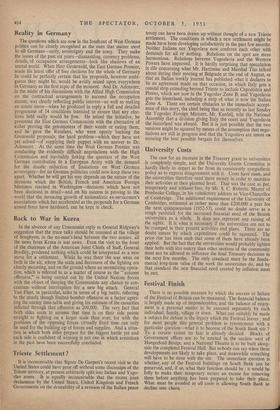University Costs
The case for an increase in the Treasury grant to universities is completely simple, and the University Grants Committee is hardly likely to depart so far from its consistently sympathetic policy as to express disagreement with it. Costs have risen, and the universities therefore need more money in order to maintain their activities at their planned level. That was the case as put, temperately and without fuss, by Mr. S. C. Roberts, Master of Pembroke College, in his valedictory address as Vice-Chancellor of Cambridge. The additional requirement of the University of Cambridge, estimated at rather more than £200,000 a year for the next quinquennium (1952-57), could no doubt serve as a rough yardstick for the increased financial need of the British universities as a whole. It does not represent any raising of the sights. It is what is necessary if the universities are not to be cramped in their present activities and plans. There are no doubt means by which expenditure could be squeezed. The price rise has been such that some of them have already been applied. But the fact that the universities would probably tighten their belts with less outcry than other sections of the community must not be allowed to influence the final Treasury decisions in the next few months. The only standard must be the funda- mental long-term value of the work the universities do, and by that standard the new financial need created by inflation must be met.





















































 Previous page
Previous page